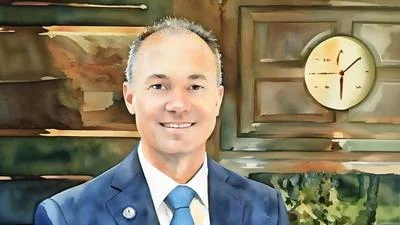For many, the war in Ukraine is a test for Western commitment to freedom, sovereignty, and democratic values. Under this view, appeasing Russia would embolden authoritarianism globally and undermine decades of hard-won liberal gains.
Dalibor Rohac, a native of Slovakia and senior fellow at the American Enterprise Institute, believes that only through sustained military, economic, and political pressure can the West secure a just outcome—and preserve its own integrity in the process.
Rohac focuses on political and economic developments in Europe, with particular attention to the post-communist transitions of Central and Eastern Europe. He holds affiliations with the Wilfried Martens Centre for European Studies in Brussels and the Anglo-American University in Prague.
He expresses deep skepticism about the current negotiations surrounding the war in Ukraine, calling former President Trump’s vow to end the war in 24 hours “a promise that was never really intended to be taken literally.” He emphasizes the wide gap between U.S. and Russian objectives, pointing out that Russia seeks “nothing short of Ukraine’s capitulation,” including regime change and a permanent veto over Ukraine’s political future.
According to Rohac, Russia’s targeting of energy infrastructure during attempted cease fires has exposed Russia’s bad faith. “The Ukrainians more or less unconditionally said yes to the U.S. administration,” he notes, while Russia has “used both opportunities to extract concessions,” including a proposed lifting of financial sanctions that would reintegrate Russia into global markets.
Hope remains that Trump may eventually grow disillusioned with Putin. “My hope is, like the hope of the Ukrainians, that sooner or later it will become obvious,” he says, and adds that then, perhaps President Trump “will snap back and maybe then will finally negotiate from a position of strength.”
Rohac is critical of any negotiations not backed by military leverage. “The idea that we can just do without that in the context of Ukraine seems fanciful,” he says, pointing to the 30,000 U.S. troops still enforcing the Korean ceasefire. Without an American backstop, he believes, European peacekeeping efforts will not be sufficient.
Economic pressure, in Rohac’s view, is also essential. The recent expiration of licenses allowing financing of Russian oil exports, he says, “does put some pressure on the Russian budget.” Rohac supports using frozen Russian assets to fund Ukraine’s recovery, arguing it would send a clear message that Russia—not American taxpayers—will pay for the war’s destruction.
In a March 28 New York Post op-ed, Rohac focused on the structural weakness of Russia’s economy. “The Russian economy and its military production are bound to hit a wall,” he wrote, citing labor shortages, high interest rates, and plummeting oil and gas revenues. “A premature ceasefire would provide a helping hand to Putin,” he said, especially if it leads to a normalization of economic ties with the West.
He believes the goal should be to create internal pressure within Russia, comparing the potential impact of sanctions and military setbacks to the role that the Afghanistan war played in bringing Gorbachev to power. “Putin is 72, 73. He won’t be around forever,” he says. “We have to think about what Russia looks like after Putin.”
The internal dynamics of Putin’s regime—what Rohac describes as a “very personalistic” power structure—create further instability. “It’s a regime in which Putin is the one who has the kompromat on everybody,” he explains. Without a clear successor, any transition could spark infighting and turmoil, but also, he believes, opportunity.
Rohac has visited Ukraine three times since the war began and is struck by the resilience of the population. “People just carry on with their lives,” he says, noting that the relative normalcy in cities like Kyiv is made possible only by the sacrifices of Ukraine’s armed forces. “As long as the neighbor to the East is committed to conquering Ukraine…they have no other option but to fight back.”
He warns against reducing Ukraine’s role in U.S. foreign policy to its potential in rare earth minerals, a point gaining traction in discussions of a “minerals deal.” Rohac is unconvinced this path will yield significant benefits. “What makes them rare is that they are difficult to mine,” he explains, adding that environmental costs, economic feasibility, and Russian proximity to key deposits complicate the picture. “Our real interest in Ukraine has nothing to do with minerals,” he insists. “It’s really this question of whether we can allow Russia to overtake neighboring countries and destroy them.”
Though framing Ukraine as a potential partner against China may appeal to Trump’s transactional instincts, Rohac remains cautious. “I’m not 100% sure it’s going to work,” he says, doubting Trump’s commitment to the bipartisan consensus on confronting China. Still, he sees it as Ukraine’s “best shot” at maintaining support.
Above all, Rohac sees Ukraine as a symbol of democratic renewal. “Ukraine is an extraordinary story of national renewal,” he says. “Together with the Georgian population, we really have a nation that is just so enthusiastic about everything that has to do with Western democracy, free markets…the values that we grew up with as essential to human dignity.” Abandoning Ukraine, he concludes, “would be detrimental most importantly to us and to our souls.”








